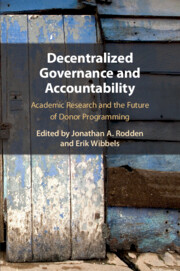Book contents
- Decentralized Governance and Accountability
- Decentralized Governance and Accountability
- Copyright page
- Dedication
- Contents
- Figures and Tables
- Contributors
- Acknowledgments
- 1 Introduction
- 2 The Social Underpinnings of Decentralized Governance
- 3 Leadership Selection Rules and Decentralized Governance
- 4 Traditional Leaders, Service Delivery, and Electoral Accountability
- 5 Decentralized Rule and Revenue
- 6 The Proliferation of Decentralized Governing Units
- 7 Decentralization and Business Performance
- 8 Decentralization and Urban Governance in the Developing World
- 9 Decentralization in Post-Conflict Settings
- 10 Clientelism in Decentralized States
- 11 Decentralization and Ethnic Diversity
- 12 From Decentralization Research to Policy and Programs
- Index
- References
12 - From Decentralization Research to Policy and Programs
A Practical Postscript
Published online by Cambridge University Press: 18 February 2019
- Decentralized Governance and Accountability
- Decentralized Governance and Accountability
- Copyright page
- Dedication
- Contents
- Figures and Tables
- Contributors
- Acknowledgments
- 1 Introduction
- 2 The Social Underpinnings of Decentralized Governance
- 3 Leadership Selection Rules and Decentralized Governance
- 4 Traditional Leaders, Service Delivery, and Electoral Accountability
- 5 Decentralized Rule and Revenue
- 6 The Proliferation of Decentralized Governing Units
- 7 Decentralization and Business Performance
- 8 Decentralization and Urban Governance in the Developing World
- 9 Decentralization in Post-Conflict Settings
- 10 Clientelism in Decentralized States
- 11 Decentralization and Ethnic Diversity
- 12 From Decentralization Research to Policy and Programs
- Index
- References
Summary
- Type
- Chapter
- Information
- Decentralized Governance and AccountabilityAcademic Research and the Future of Donor Programming, pp. 273 - 286Publisher: Cambridge University PressPrint publication year: 2019



